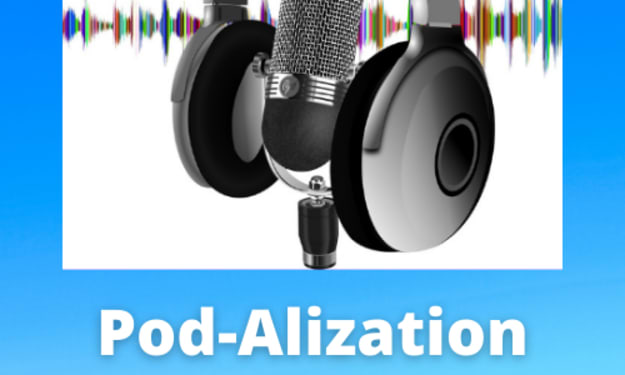Plastics Recycling; Teeth Grinding; Book Sales
What We learned From Podcasts This Week

You would think the holidays would be the ideal time to decompress from podcasts. However, an interesting and informative podcast can act as a stress relief from all the family visits, gift exchanges, and lofty expectations we set during the holidays.
This week, I learned that recycling plastics is a fiction, just like widespread election fraud. I also learned that you can devote an entire podcast episode to grinding your teeth. Finally, those who predict the death of reading every year are wrong yet again. Look people, watching an episode of Yellowstone on TV is not the same as reading, no matter how much you claim it is.
Short Wave
On the December 12th episode of Short Wave, NPR correspondent Laura Sullivan exploded one of our most enduring modern myths. No, not the one about that gut who slides down everyone's chimney. No, the one where plastics can actually be recycled in any significant way.
During her investigation, Sullivan discovered that after 30 years of recycling efforts, the most optimistic estimate of plastics recycling is 30 percent. It goes downhill fast from there. After contamination eliminates a large percentage of plastics from recycling, Sullivan informs us that very little plastic is recycled.
The different kinds of plastic make it difficult to recycle -- no mix and match of plastics allowed -- and the plastic must be in excellent condition with material contamination. The gut punch is Sullivan's revelation that plastic can only be recycled once and can only be recycled as something like carpet fiber, not more soda bottles.
Then, when we are reeling from the revelations about plastics, Sullivan informs us that more plastics are produced, especially in China, than ever before.
No Stupid Questions
The No Stupid Questions podcast spent 44 minutes on November 27th discussing teeth grinding, or bruxism, as it is called. How is that possible? Not only did co-hosts Duckworth and Dubner accomplish that feat of conversational wizardry, they managed to make it interesting.
Bruxism is a condition in which you grind, gnash or clench your teeth. If you have bruxism, you may unconsciously clench your teeth when you're awake (awake bruxism) or clench or grind them during sleep (sleep bruxism). Sleep bruxism is considered a sleep-related movement disorder.
In the episode, Duckworth admits to teeth grinding. She tells the listeners that about 50 percent of the population grinds their teeth. This condition can cause jaw pain and teeth problems. Duckworth tells us that most people do not even notice that you’re grinding your teeth during sleep. Of course, a partner may be your first alert system.
While Dubner asks questions about teeth clenching, Duckworth alerts us to the potential severity of the condition. People that grind their teeth while asleep can use up to 250 pounds of force, causing jaw pain and teeth problems. Clenching can also lead to headaches.
Apparently, the two types of bruxism -- sleep and awake -- have disparate pathologies. Awake bruxism is usually tied to emotional issues. Feeling anxious, stressed or angry can lead to teeth grinding. But so can concentrating on something. Awake bruxism often doesn’t need treatment, if you’re more likely to notice and stop. Stress management can help, and learning ways to become aware can also help reduce the frequency.
Sleep bruxism requires more active treatment, since you typically don't realize you're grinding your teeth while sleeping. Night guards, meditation, and cognitive behavioral therapy (Talk therapy) can help. During the episode, the co-hosts discuss the latest treatment for teeth grinding -- Botox. In some studies, Botulinum toxin used for treating bruxism has lasted for three to four months.
Book Riot and On The Media
Sometimes podcasts are in sync, like the Book Riot podcast and WNYC's On The Media podcast. Book Riot is a highly engaging podcast for book lovers and reading acolytes, and covered their year-end "Top Bookish Stories of 2022."
On The Media -- 30 years old in 2023 -- covers the media and dedicated their December 30th episode -- "Bookish" -- to books. In their first of four segments, host Brooke Gladstone interviewed Alexandra Alter from the New York Times (contributor to the New York Times Book Review podcast) on trends in book publishing and reading and how supply chain issues have affected the industry.
Alter explained how the pandemic energized book sales in 2020 and 2021 with impressive growth rates. While 2022 saw a retreat from those growth rates, last year's sales still topped 2019 levels.
Alter also dispensed good news in the bookseller industry. First, independent book stores increased by 300 in 2022, which is an impressive achievement, and a wake-up call for Amazon that people do love their neighborhood bookshops with their diverse and localized reader interests in mind.
Check out bookshop.org to support your local, neighborhood bookstore.
Book Riot mirrored those numbers and conclusions and mentioned that the average American reads 20 minutes a day, up four minutes from a year ago. That's great news.
“Once you have read a book you care about, some part of it is always with you.” - Louis L’Amour.
*******
Podcasts offer listeners the thrill of being entertained, informed, and persuaded. While radio and TV can do all three, both have, in recent years, focused on entertainment (TV -- The Masked Singer) and persuasion (The onslaught of conservative radio talk shows where fellow Americans are identified as enemies and conspiracy theories abound).
Podcasts still offer listeners the opportunity to digest factual information with no political or ideological strings attached. For example, check out Dan Carlin's Hardcore History or Stuff You Should Know.
About the Creator
Frank Racioppi
I am a South Jersey-based author who is a writer for the Ear Worthy publication, which appears on Vocal, Substack, Medium, Blogger, Tumblr, and social media. Ear Worthy offers daily podcast reviews, recommendations, and articles.






Comments
There are no comments for this story
Be the first to respond and start the conversation.